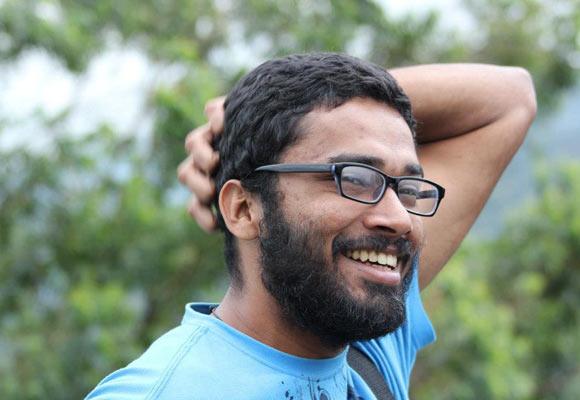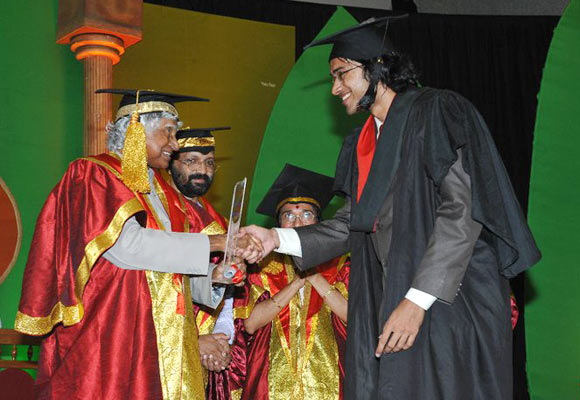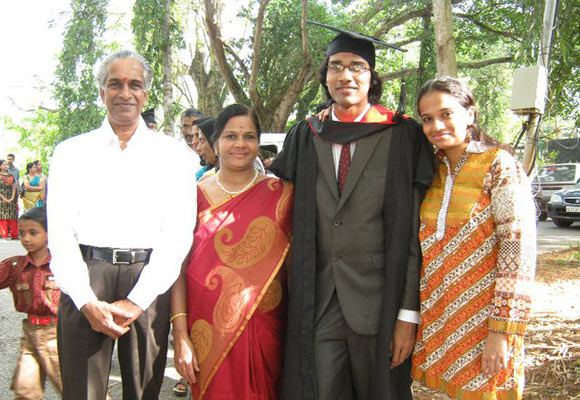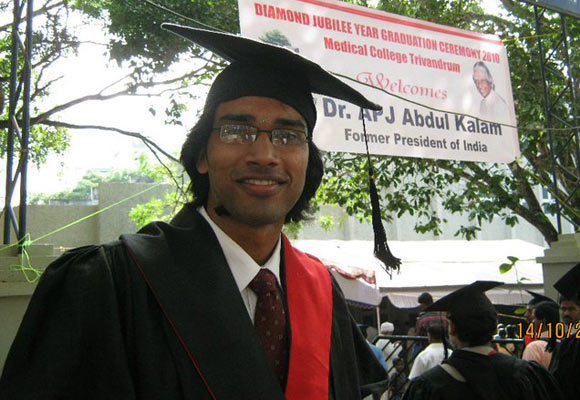
Cuttack-based medical graduate Sriram Venkitaraman, who came second in this year's Union Public Services Commission examination says he has "realistic expectations" of his IAS career.
The country's second UPSC topper Sriram Venkitaraman is not one of those achievers who hails from a humble background or for whom becoming an IAS officer was a childhood dream.
And yet, this Cochin-born medical graduate was inspired to appear for the civil services examination a second time after a failed first attempt in 2011.
"I wasn't serious the first time around," he tells me. "For my second attempt, I was determined. I'd analysed what went wrong and worked on my methodology. Also, I wasn't scared of failure, so that was an advantage."
When I ask the future IAS officer how he aims to aid society, this is what he has to say: "Just like you and everyone else in this country, I am concerned about the increasing corruption, bad governance, lack of transparency and social apathy. But I also believe that social change is a slow, two-way process. An IAS officer cannot single-handedly bring on a revolution overnight," he explains with a conviction that is rare among present-day youngsters.
"If you want a better country, stop the blame game and join us in the quest. It is a long journey, and we can definitely do better than we are doing now," he continues. "I believe in reality."
Like any other 26-year-old, Venkitaraman likes watching movies, hanging out with friends and travelling to new destinations. I learn that he is not a voracious reader, but is up-to-date with current affairs.
And that's just one part of his life.
By profession, he is an MBBS graduate from Trivandrum Medical College and finds happiness in serving the poor. He is currently pursuing his post-graduation in medicine from Shri Ramachandra Bhanj Medical College in Cuttack, Orissa.
Venkitaraman's family lives in Cochin. His father, Dr P R Venkitaraman, is a professor of zoology and mother Rajam Ramamoorthy works for the State Bank of India; his sister Lakshmi is pursuing a medical internship at Amala Medical College, Trissur.
So, what really inspired this doctor to appear for the civil services exam a second time? And more importantly, how does he plan to bring about social change? Read on for interesting insights from the topper...
Please click 'NEXT' to continue reading...

You failed in your first attempt and came second in your next. What do you think you did right this time around?
I think the biggest advantage for me was that I wasn't carrying the baggage that most other aspirants are burdened with.
Becoming an IAS officer wasn't really my childhood dream, so my failure the first time around did not have much of an impact on me.
I was disappointed, but it wasn't the end of the world. I spoke to my friends, who encouraged me to give it another shot. They said that I had come too far to give up so easily, considering that I didn't even intend to appear for the exam initially. That pep talk boosted my confidence.
After my first attempt, I realised that I needed to pay more attention to general studies, which was my weakest area. And I dedicated more time towards preparation. Since I had given the exam earlier, it also helped me analyse the mistakes I made and correct them.
I was expecting better results this time, but the second rank was the icing on the cake.
Why did you undertake to appear for the UPSC exam in the first place?
As children, all of us grow up listening to the glorious achievements of IAS and IPS toppers. But somehow, in my case, I never took them so seriously. I did not bother finding out about the application procedure or any other details regarding the exam.
After completing Class 12, I was inclined towards medicine. But after pursing my graduation, a conversation on Facebook with Lakshmi, an old school friend who was already preparing for the UPSC, gave me some perspective. She suggested that if I became an IAS officer, I could probably make better use of my medical education and knowledge.
After considering it extensively, I thought, why not? I had nothing to lose by appearing for the exam.
I had already planned to appear for my medical post-graduation entrance test. Preparing for the UPSC would probably be another learning experience, I thought. That's how the IAS bug bit me. It wasn't a conscious choice, but it was a passionate one.
How did you prepare? What do you think was your winning strategy?
After I cleared the preliminary rounds, I enrolled in a coaching centre. The Kerala State Civil Service Academy in Thiruvananthapuram, which offers free civil services coaching, was the perfect training ground for me.
There I interacted with several like-minded people, both old and young. The academy has a huge library, with an extensive collection of books where you can sit and study for hours.
I also took several practice tests. The group study activities gave me confidence to tackle the exam. One of my subjects was zoology and I was lucky to have Professor Ravishankar teach me the subject; he is an excellent tutor.
Looking back, I would say my past failure had a lot to contribute to my present success.
It is only after I gave my first exam that I realised what the UPSC paper actually demands. It was an eye-opener in many ways. One needs sound knowledge and hours of writing practice to crack the exam.
Tell us about your interview round.
It was more like a personal interview, but the UPSC calls it a 'personality test'. The interview was held in Delhi and in my case there were five panelists.
Each of them asked me different questions -- about my career choice, inclination towards the civil services, my hobbies and interests, among other things.
One of them wanted to know why I would like to give up on a lucrative profession like medicine to pursue a career in the IAS.
I told them that money wasn't really the driving force. I explained that if I became a doctor I would be able to serve society at a minor level, but that the IAS would expose me to a stronger and bolder platform where I could make better use of my medical knowledge.

How do you intend to make use of the IAS opportunity?
Frankly, I don't have any big dreams and aspirations; it's not like I want to become an IAS officer and change the country and all that.
Realistically speaking, I am yet to undergo my training. Once that is over, I will be in a better position to understand my powers and responsibilities.
After I get my posting orders, I will have to do my homework too. There are issues both at the macro and micro level that I would like to address.
I believe that social change comes from everyone who is part of a society. We must not forget that we are all part of a larger system. If you don't like something, change it, stop it or at least try to do something about it.
Blaming someone is the easiest thing to do. If you do not like corruption, do not indulge in it too. Little things matter. I will do my job as an officer, but are you doing your job as a responsible citizen? Ask yourself that.
We must all learn to believe that good people do exist and that good things can happen.
Who inspires you?
It would be difficult to identify specific people, because I feel that everyone we meet has something to add to our lives.
Whatever I am today, is probably because of the people I have met -- it could be the amazing teachers at my school and college, or my friends, or just one of the random people I have interacted with.
I may not even remember who some of them are, but they may have changed something in me -- maybe the way I think, the way I look, or the way I react?
What did you learn from your medical career?
Before I entered medical college, I was an immature, careless guy. I was happy in my own world, passing time with my friends.
But during my MBBS, I encountered people with rare diseases and problems -- physical, social, financial and psychological. That exposed me to reality. Each day threw up a new challenge, but I also had a new experience and learned a new lesson.
My interactions with professors, doctors and patients impacted me in many ways. Whenever I saw a child, or a poor and old person suffer and struggle, I would wonder what they'd done to suffer so much. We don't have the answers or the solutions to some of these problems.
However, the experience has made me both sensitive and responsible in many ways. For example, whenever someone thanks me or smiles for a job well done, I feel humbled and committed to do better. I hope I can incorporate my knowledge and sensibilities into my IAS career as well.

Are you an avid reader? Do you have any favourite books or authors?
I am not a big fan of literature or books. I believe in reality. However, there is one book I have read that proved very memorable -- the Malayalam novel Khasakkinte Itihasam by O V Vijayan, which is translated into English as The Legends of Khasak.
It is a spellbinding, thought-provoking book. It has no story or message, but it's a collection of experiences, rare and mystical. The multiple layers of the protagonist's character will continue to enchant you for days after you have read it.
What are your interests?
I love watching movies, irrespective of their language. I enjoy spending time with my friends and whenever I get the opportunity, I plan trips with them -- to Ooty, Goa, Pondicherry.
Recently I got interested in street photography. Armed with a Canon 550D, I take to the streets and click random people on the road. It's a relaxing hobby.
I also play basketball and cricket.
What's your advice to UPSC aspirants?
I'm really glad you asked me that. I would suggest that they stop thinking of the civil services as a money-making career. If you think that way, I think you are climbing up the wrong tree.
Before you apply, ask yourself whether you really want to do it and why you want to do it. I know a lot of people who go to Delhi and spend many years of their life trying to crack the exam without any definite goal.
Let me tell you, a coaching centre will only get you so far. You must have the passion and a valid reason to pursue this career. Like any other, it demands excellence in academics along with responsibility towards one's duties and conviction too.
Ask yourself: Are you mature enough? Do you have the right attitude to crack it?
Also, I would suggest that whenever you are appearing for a competitive exam, you must have a back-up plan. In my case, when I failed my first UPSC attempt, I cracked the post-graduate medical entrance test and could pursue that in the meantime. It also really worked to take the focus off my failure.
The UPSC exam is just like any other exam. Unless you try, you won't know what you are capable of. Do not be scared of failure and face it just like any other exam.
Even if you fail, you will gain something out of it. The knowledge you gained while preparing and appearing for the exam will never go waste.
Do you have a message for our young readers?
Don't be cynical, don't be rigid. Be flexible and open to change. Listen to other people and consider their suggestions, but more importantly, be happy with the decisions you take and the things you choose to do.
If something you are doing doesn't make you happy, it's a sign that you need to change or move away from it. Don't make decisions based on peer or family pressure.
You must be able to enjoy your life, and your choice of career can either be a source of happiness or the lack of it. So make a wise decision.